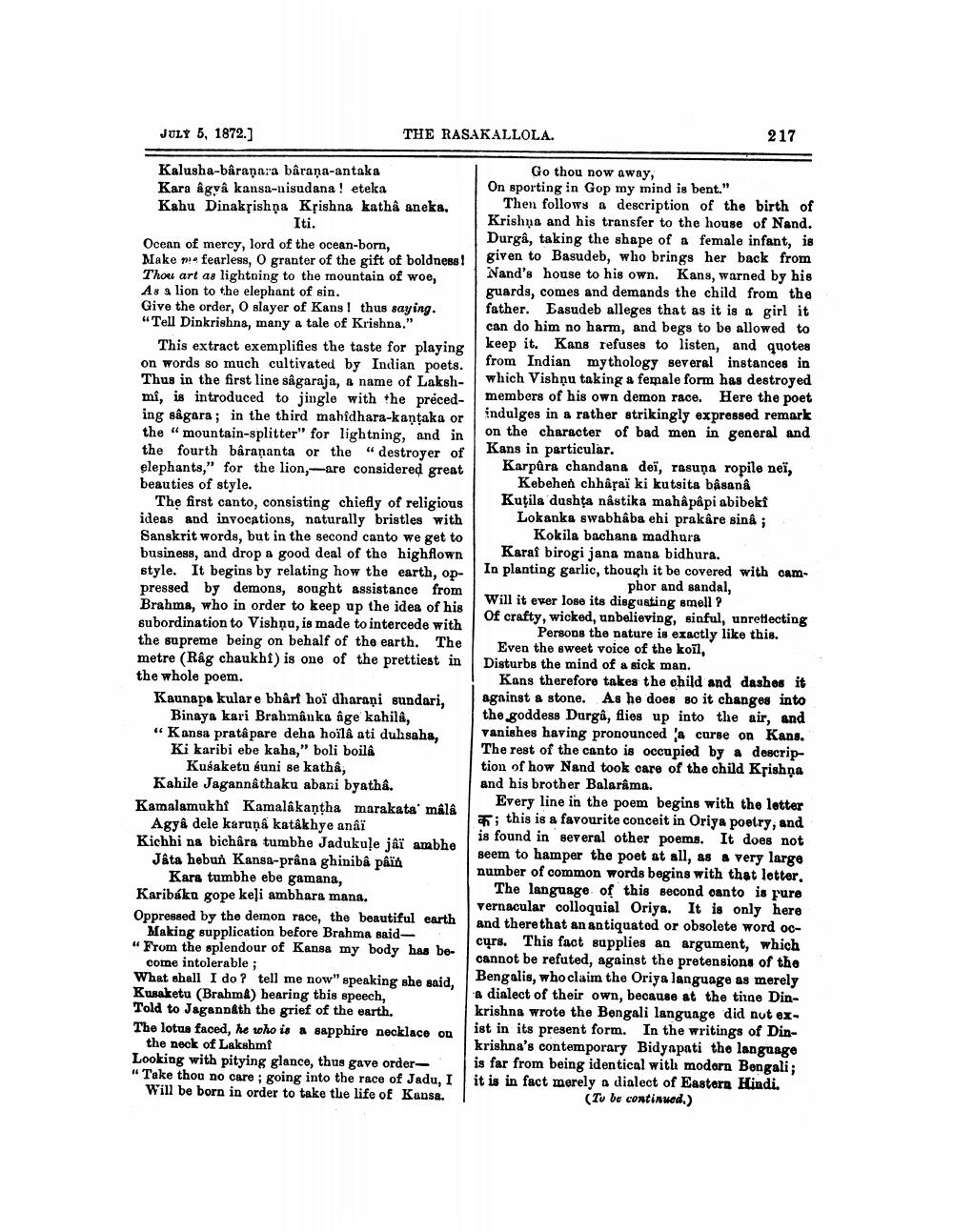________________
JULY 5, 1872.]
THE RASAKALLOLA.
217
Kalusha-baraṇara bâraņa-antaka Kara âgvå kansa-nisudana! eteka Kahu Dinaksishna Krishna kathâ aneka.
Iti. Ocean of mercy, lord of the ocean-born, Make me fearless, O granter of the gift of boldness! Thou art as lightning to the mountain of woe, As a lion to the elephant of sin. Give the order, 0 slayer of Kans! thus saying. "Tell Dinkrishna, many a tale of Krishna."
This extract exemplifies the taste for playing on words so much cultivated by Indian poets. Thus in the first line sågaraja, a name of Lakshmi, is introduced to jingle with the preceding sâgara; in the third mahidhara-kantaka or the mountain-splitter" for lightning, and in the fourth bârananta or the "destroyer of elephants," for the lion-are considered great beauties of style.
The first canto, consisting chiefly of religious ideas and invocations, naturally bristles with Sanskrit words, but in the second canto we get to business, and drop a good deal of the highflown style. It begins by relating how the earth, oppressed by demons, sought assistance from Brahma, who in order to keep up the idea of his subordination to Vishņu, is made to intercede with the supreme being on behalf of the earth. The metre (R&g chaukhi) is one of the prettiest in the whole poem. Kaunapa kular e bhârf hoï dharani sundari,
Binaya kari Brahmânka âge kahila, “ Kansa pratâ pare deha hořlå ati dulasaha, Ki karibi ebe kaha," boli boilê
Kusaketu suni se katha, Kahile Jagannathaku abani byatha. Kamalamukhi Kamalakantha marakata mala
Agya dele karuņa katakhye anar Kichhi na bichara tumbhe Jadukuļe jar ambhe Jäta hebun Kansa-prâna ghiniba pain
Kara tumbhe ebe gamana, Karibáku gope keļi ambhara mana. Oppressed by the demon race, the beautiful earth
Making supplication before Brahma said "From the splendour of Kansa my body has be
come intolerable ; What shall I do? tell me now" speaking she said, Kusaketu (Brahma) hearing this speech, Told to Jaganngth the grief of the earth. The lotus faced, he who is a sapphire necklace on
the neck of Lakshmi Looking with pitying glance, thus gave order"Take thou no care ; going into the race of Jadu, I
Will be born in order to take the life of Kansa.
Go thou now away, On sporting in Gop my mind is bent."
Then follows a description of the birth of Krishna and his transfer to the house of Nand. Durga, taking the shape of a female infant, is given to Basudeb, who brings her back from Nand's house to his own. Kans, warned by his guards, comes and demands the child from the father. Easudeb alleges that as it is a girl it can do him no harm, and begs to be allowed to keep it. Kans refuses to listen, and quotes from Indian mythology several instances in which Vishnu taking a female form has destroyed members of his own demon race. Here the poet indulges in a rather strikingly expressed remark on the character of bad men in general and Kans in particular. Karpura chandana dei, rasuņa ropile nei,
Kebehen chhâșaï ki kutsita bâsanâ Kuţila dushţa nâstika mahâpâpi abibeki Lokanka swabhâba ehi prakâre sina ;
Kokila bachana madhura Karaf birogi jana mana bidhura. In planting garlic, though it be covered with oam
phor and sandal, Will it ever lose its disgusting smell? Of crafty, wicked, unbelieving, sinful, unrettecting
Persons the nature is exactly like this. Even the sweet voice of the koil, Disturbs the mind of a sick man.
Kans therefore takes the child and dashes it against a stone. As he does so it changes into the goddess Durga, flies up into the air, and Vanishes having pronounced a curse on Kans. The rest of the canto is occupied by a description of how Nand took care of the child Krishna and his brother Balarama.
Every line in the poem begins with the letter
; this is a favourite conceit in Oriya poetry, and is found in several other poems. It does not seem to hamper the poet at all, as a very large number of common words begins with that lottor.
The language of this second oanto is pure vernacular colloquial Oriya. It is only here and there that an antiquated or obsolete word occurs. This fact supplies an argument, which cannot be refuted, against the pretensions of tho Bengalis, who claim the Oriya language as merely a dialect of their own, because at the tine Dinkrishna wrote the Bengali language did not exist in its present form. In the writings of Dinkrishna's contemporary Bidyapati the language is far from being identical with modern Bengali; it is in fact merely a dialect of Eastern Hindi.
(To be continued.)




